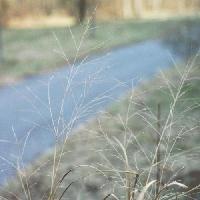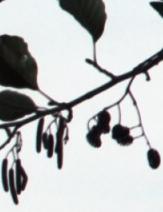


In the center of the round, white blossom -- the compound umbel -- of Queen Anne's Lace is a single, tiny red/purple flower. Though small, it's shocking as a bloodstain, or bright red lipstick on a pale face. It's all very sexual: the lace is bridal and the red blossom nothing short of a deflowering. And, as they senesce, the blossoms involute, curl up, introvert. They become gray/brown, dry, spare, frail. The incurling rays are still astonishingly beautiful.
What drew me to the weed that, for lack of identification, I've had to call "the beautiful nameless grass" was both its macroscopic elegance -- it's chest high, with long, arced, graceful blades, and a flame-shaped, open airy seedhead -- and the shocking extravagance of its seeds. They're tiny, maybe 3 mm, and relatively sparsely arrayed on each spikelet. Late summer, each seed bore tiny feathery tongues of the most extravagant mauve and orange -- appendages that seemed more suited to orchis or lepidoptera that to a Northern riverside weed. They reminded me of feather boas -- sexual, seductive, alluring. As auntumn deepened, of course, the seeds lost their fantastic antennae, the grass turned dry and brown. But still, the seedhead kept its flame shape: abstracted, platonic.
One of my river photos was of tree branches against sky: the branches were mostly bare, but still bore a few round leaves, and two kinds of pods: long ones and round ones. These were easy to find in the tree book: it's an alder, and the pods are male and female catkins. The long ones, Freudianly enough, are male, and the round ones female.
Beautiful, extravagant, sexual nature.
I've found it not comforting, exactly, but somehow appropriate, to have had this several month bout of retreat and broken-ness be in autumn. I am decades past my deflowering; I grow smaller, dryer, more abstract; I am going to seed in a decidedly unbotanical way, dispersing, and my elements will persist utterly changed, distributed, incorporated. I think of the eons that preceeded my birth; I think of the eons that will follow my death. I think of the moment of creation, the big bang, when everything that is was together, all of us. I try to envision something enormous enough to include all that, some compassion, some God-is-Love: and, at that final extra step, that leap of faith, that moment of appeal, I fail. I can't say it. Can't say "This is God," or "I believe in God." Can't posit a deific object separate from everything, separate from me, from you, from the river, from the beautiful grass, from my eye that sees it, from my mind that wants so much to know its name.
But maybe it's just a word, after all. Maybe it's best kept nameless. Maybe, if I had found the grass in my field guide, I might have stuck it in an easy category -- oh, that's just witchgrass, johnsongrass, sorghum -- and missed the wild and generous detail of its appearance and evolution.
There's even more at risk in naming God.
No comments:
Post a Comment